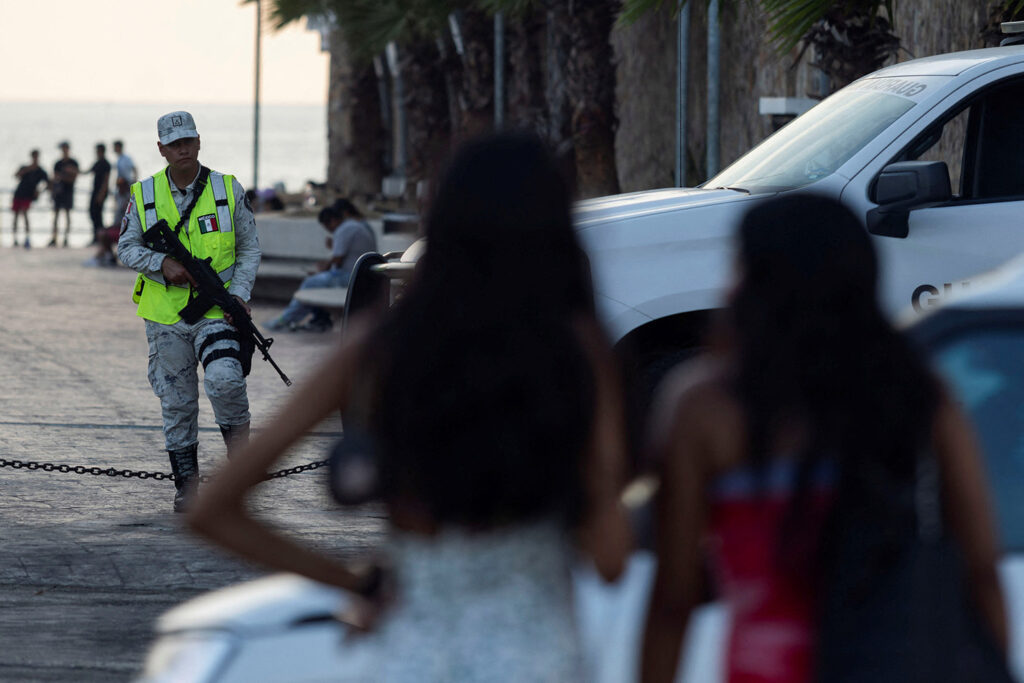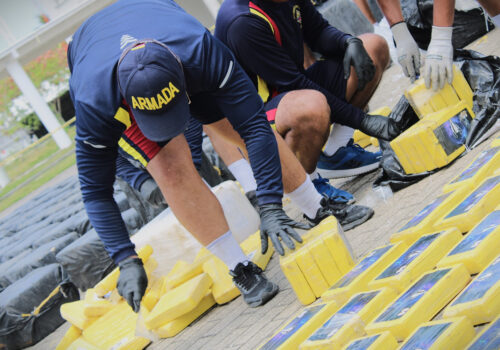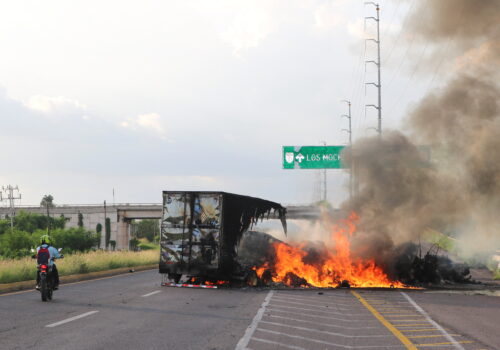This is the second in a series of explainers about the interconnectedness of criminal markets in Latin America and the Caribbean, written by the Atlantic Council’s Adrienne Arsht Latin America Center. To get notified about future editions and other related work on the region, sign up here.
This month, US officials—from the US secretary of state to the Treasury undersecretary for terrorism and financial intelligence—have visited Mexico, talking with officials there about tackling cartels and other transnational criminal organizations.
These trips took place amid US President Donald Trump’s broader campaign to eliminate criminal organizations. But such a task is challenging. Transnational criminal organizations, in addition to smaller cartels, have become deeply embedded in Mexico’s society.
In Mexico, these organizations have access to one of the most diverse criminal market landscapes in the world. Their presence has become an accepted part of society and an expected cost of conducting business in many areas, which enables them to act more brazenly and openly. Additionally, these organizations have extended their influence in public institutions, weakening the ability of these institutions to serve citizens effectively. Such factors have led the Global Organized Crime Index to place Mexico as the third-highest among 193 countries in terms of criminality.
Countering these groups will take far more than fighting them with security forces; Mexican officials will need to restore trust across institutions and ensure they remain resilient to illicit influence.
Criminal organizations in Mexico operate openly and with impunity. In 2022, a Mexican government agency estimated that 4.7 million extortion attempts occurred. A separate victimization study showed that in 2023, 15 percent of businesses were extorted in person, but 67 percent of the businesses extorted in person paid up. Despite the reduced level of success in receiving payment, approximately 85 percent of attempts took place remotely.
The same government agency also estimated that 97 percent of extortion attempts in Mexico were not reported to the police in 2023. Businesses, from small farming operations to large corporations, have seemingly acknowledged and accepted extortion as a cost of doing business. In 2024, the parent company of convenience stores in Nuevo Laredo temporarily closed its 198 shops and gas stations due to gang violence that impacted its employees; in doing so, the company acknowledged that it had long had to deal with demands from cartels, such as where the stores sourced their fuel from.
Part of the challenge of responding to criminal groups in Mexico is the sheer number of them and the overlapping activities in which they are involved. For example, Mexico has become a hub for human trafficking, with multiple criminal organizations involved. A Belisario Domínguez Institute report estimated that forty-seven different criminal groups were involved in human trafficking in Mexico, making it especially difficult for reputable law enforcement agencies to respond. Nonprofit organization Consejo Ciudadano received 2,541 reports of human trafficking from 2021 to 2022, and the Mexican government’s data, while much lower than Consejo Ciudadano’s figures, shows a rise in reports from 2022 onward. Additionally, these trafficking operations stretch far and wide around the globe: Victims of Mexican origin were found internationally in the United States, Canada, Spain, Egypt, Russia, and India, as well as throughout Central and South America. Such reach makes it difficult to respond to criminal groups and their operations.
Other criminal markets in Mexico often mirror the complex web and vast resources seen in this human trafficking problem, making it more challenging for local security elements to protect their communities, especially when multiple criminal markets converge.
Estimates of cartel membership suggest that such groups would rank as the fourth-largest employer compared to public companies in Mexico. This number signifies not just the scale of criminal involvement in the country but also groups’ ability to control elements typically more insulated from corruption.
The high number of employees, as shown in the graph, helps cartels continue their activities and maintain their leverage in public institutions by ensuring sympathetic candidates are elected through both voting and violence. México Evalúa reported that between 2021 and 2024, there was a 270 percent increase in the number of victims of political violence and a 356 percent increase in murders associated with political violence.
Another reason it is difficult to respond to transnational criminal organizations is that some of them have a global reach. One such organization is the Jalisco New Generation Cartel. Its supply chains and subsidiaries (not just its markets) span the globe.
Partners or subsidiary organizations located around the world facilitate everything from money laundering to the refinement of drugs, from real estate investment to illegal mining, ensuring a diversification of profit flows and complicating law-enforcement actions. As fiercely competitive organizations expand globally, countries seen as both markets and facilitators face an increasing risk of internal nonstate war, a level of violence familiar to Mexico.
For more than fifteen years, aid to Mexico has typically been designated for strengthening the rule of law and countering criminal organizations, with questionable effectiveness. Most recently, the United States and Mexico’s 2021 Bicentennial Framework expanded the countries’ cooperation on these efforts and recognized that criminal organizations posed a problem to both countries. However, the US Government Accountability Office, in its 2023 review of this assistance, noted that there were no specifics regarding projects were being funded and identified to meet which goals, no outlined milestones to indicate success or improvement, and no monitoring or evaluation of programs to determine if the aid was being used successfully. Due to these missing elements, the Government Accountability Office argued that determining whether US assistance was achieving Washington’s goals is impossible.
Cartels and transnational criminal organizations have permeated every level of Mexican society, and military action alone cannot address this. Rather, a whole-of-government approach is the only viable solution to repairing trust and recalibrating the understanding of normalcy among citizens.
Yet, based on the sheer size and pervasiveness of these organizations, as well as their international reach, it is unlikely that Mexico will be able to dismantle these organizations unilaterally. International coalitions are necessary for the security of Mexico and neighboring and impacted countries. But without clear accountability mechanisms and metrics of success, coalitions will fall short of their aims, lose support, and further entrench the crisis.
Aaron Kolleda is a major in the US Army and was a visiting fellow at the Atlantic Council’s Adrienne Arsht Latin America Center.
The views in this article are the author’s own and do not reflect the position of the US Department of Defense or the US Department of the Army.
Further reading
Wed, Sep 10, 2025
What to know about Trump’s war on drug trafficking from Venezuela
New Atlanticist By
The recent US strike on a suspected drug trafficking boat is best understood in the context of the Trump administration’s policies toward Venezuela and the wider Western Hemisphere.
Thu, Aug 7, 2025
Five charts that show how criminal organizations in Colombia work—and grow
New Atlanticist By
Our experts break down the numbers that show the reach, power, and influence of drug cartels and other transnational criminal organizations.
Wed, Jul 23, 2025
A terrorist designation should only be the start in weakening Mexican cartels
New Atlanticist By
The Trump administration’s designation of several Mexican drug cartels as foreign terrorist organizations must be followed by actions that meaningfully weaken those groups.
Image: A member of the National Guard patrols near a beach, as Mexico revamps its judicial system after years of rampant lawlessness, in Acapulco, Mexico on February 10, 2025. Photo by Quetzalli Nicte-Ha via REUTERS.



